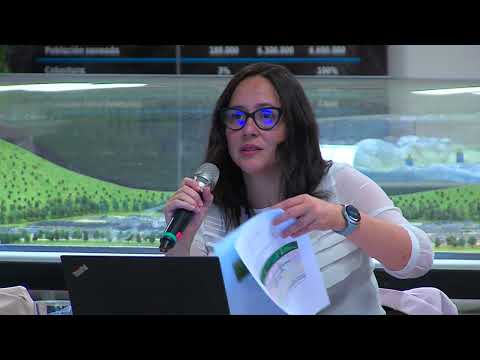The Natural Resources Division of ECLAC organized the workshop "Capacity building to promote investments in the drinking water and sanitation sector with a circular economy approach" supported by UNPDF, GIZ and Aguas Andinas.
Work area(s)
Topic(s)
The workshop, organized on Tuesday, January 31st, 2023, took place at the Planta de Tratamiento de Aguas Servidas Mapucho-Trebal, of Aguas Andinas, potable water and sanitation company in Santiago, Chile. The event featured experts in the wastewater treatment process and representatives of potable water and sanitation agencies from Panama, El Salvador and Mexico.

On Tuesday, January 31, 2023, the workshop, “Capacity building to promote investments in the drinking water and sanitation sector with a circular economy approach", was organized at the Planta de Tratamiento de Aguas Servidas Mapocho-Trebal of Aguas Andinas, a company that supplies drinking water and sanitation to Santiago de Chile. The workshop was organized in the framework of the projects "Potable Water, Sanitation and Renewable Energies in El Salvador, Mexico and Panama" (UNPDF) and “Transformative recovery: Overcoming the consequences of the COVID-19 pandemic” (GIZ) and was organized jointly with the 2023 Regional Water Dialogues of Latin America and the Caribbean.
The day began with technical presentations by ECLAC specialists, after which a space for exchange and dialogue was opened to share experiences and challenges recognized by national authorities.
On behalf of ECLAC, Dr Silvia Saravia Matus began by presenting ECLAC's circular economy approach to the drinking water and sanitation sector. Throughout her presentation, she shared more details about the ongoing projects financed by the United Nations Fund for Peace and Development and the German Cooperation that seek to promote principles of circularity to gain energy efficiency on the one hand and waste recovery on the other. Next, Diego Fernández and Alfredo Montañez, official consultants of the Natural Resources Division of ECLAC, presented the methane recovery opportunities, focusing on the study carried out by ECLAC published in 2022. In addition, Pedro Chavarro, official consultant of the Natural Resources Division, presented a vision of the energy use of the drinking water and sanitation sector, highlighting the energy intensity of the sector and a roadmap on how to transform it through better planning and investment at crucial stages of the purification and sanitation process. To close, Professor Antonio Santos, an expert in nutrient recovery issues as a circular economy option for wastewater treatment, participated.
The presentations can be found and downloaded at the following link. The recording of the technical interventions can be viewed at ECLAC's YouTube Channel.
Thereafter, the representatives of the drinking water and sanitation authorities, coming from El Salvador (ANDA, ASA) and Panama (IDAAN and CONAGUA), presented the country-specific contexts, current situations and capacity-building needs. The authorities emphasized themes like investment in infrastructure, energy efficiency, and innovation, as well as monitoring, regulation and visualization of water prices to progress towards the SDG 6 targets. These needs will be consolidated in a diagnosis and training material in order to promote investment plans in the drinking water and sanitation sector under a circular economy approach for the entire region.
The workshop ended with a presentation by Aguas Andinas. The different processes and functions of the Mapocho-Trebal biofactory were exposed, and the circular economy approach in the treatment of wastewater, such as methane recovery, which the company is carrying out, as well as the distribution of sludge to improve ground quality. The company is a pioneer in implementing the principles of the circular economy, as well as raising green bonds to finance infrastructure projects and improvements.
The workshop was considered a great success with maximum satisfaction amongst the participants. In the following links you can review the results of the entry and exit surveys of the workshop.
Related content

Great interest in the Water, Financing and Health panel at the Regional Water Dialogues 2023
On February the 2nd of 2023, the panel "Water, Financing and Health" was organized during the Regional Water Dialogues for Latin America and the Caribbean, which took place between February 1 and 3…

Taller CEPAL "Inversiones en agua potable y saneamiento con enfoque de economía circular"
El taller "Desarrollo de capacidades para impulso de inversiones en el sector de agua potable y saneamiento con enfoque de economía circular" tuvo lugar en la Planta de Tratamiento de Aguas…